Term Page
Post-Conviction Relief 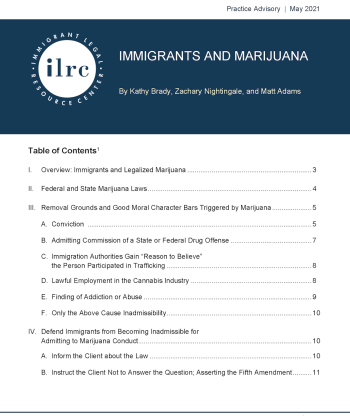
The majority of states have legalized some use of marijuana, but marijuana remains a federal Schedule I controlled substance. Therefore, any conduct involving marijuana can be very dangerous for immigrants – including conduct that is permitted under state law. Admitting that one has “legally” used marijuana, being employed in the fast-growing cannabis industry, and any conviction can cause serious immigration problems. A prior marijuana conviction must be vacated based on some error; the fact that the state has since legalized the conduct does not erase it, and many state “mass expungement” actions also do not. Evidence that a person has sold marijuana can harm any noncitizen, in some cases including immigrant youth. Marijuana issues can cause bars to eligibility for affirmative applications such as adjustment of status and naturalization; admission at the border; and cancellation and other applications in removal proceedings.
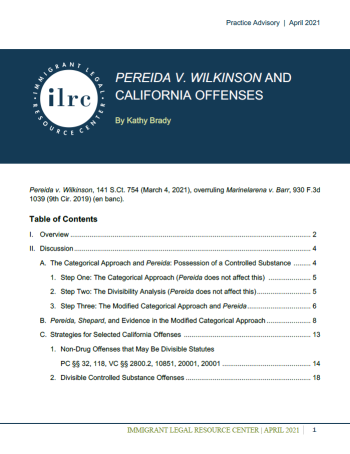
In Pereida v. Wilkinson, 141 S.Ct. 754 (March 4, 2021), the Supreme Court issued another opinion on the categorical approach, which is the analysis authorities use to decide whether a criminal conviction triggers removal grounds. Pereida focuses on the “modified” categorical approach, which is how courts approach a conviction under a statute that sets out multiple, separate, offenses (a “divisible” statute). Pereida overruled Marinelarena v. Barr, 930 F.3d 1039 (9th Cir. 2019) (en banc).

We previously circulated a sample brief, Using and Defending PC 1473.7 Vacaturs. But, at times, DHS continues to object to 1473.7 vacaturs. Thanks to Pangea Removal Defense Attorney Luis Angel Reyes Savalza and Immigration Attorneys Merle Kahn and Daniel Shanfield for agreeing to sharing their his recent redacted responses to DHS opposition. This briefing includes a response as to why the 2019 amendments to 1473.7 do not, in fact, turn the statute into a rehabilitative mechanism.
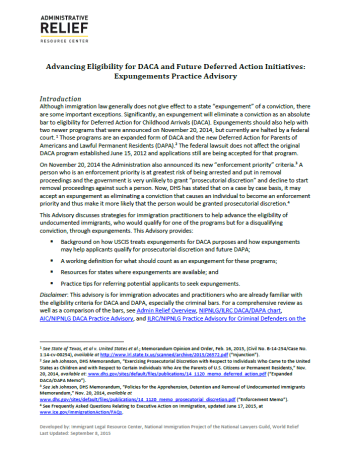
Certain criminal convictions are bars to eligibility for DACA. However, if these convictions can be “expunged,” they will cease to be an absolute bar. Here, an “expungement” refers to any legal process where a criminal court can withdraw, erase, seal, or otherwise eliminate a conviction under a state statute, based on the fact that the person completed probation or other requirements, or for humanitarian reasons. Note that while DACA government materials call this an “expungement,” different state laws may use different terms for this kind of rehabilitative relief. An expungement is not given effect for most immigration purposes – but it does work for DACA. For example, a misdemeanor conviction for driving under the influence is a bar to applying for DACA as a “significant misdemeanor.” If the person has the conviction “expunged,” however, they are not barred from applying, and if they have enough positive equities they may well be granted DACA.
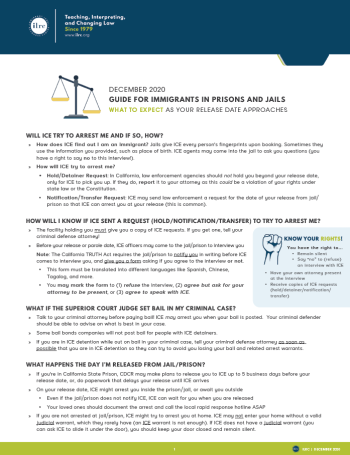
This one-pager goes over basic Know Your Rights information for immigrants incarcerated in California prisons. It includes suggested contact information for families and community members in need of immigration screening.
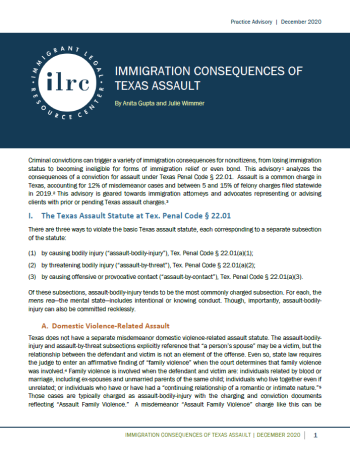
This practice advisory explains the various immigration consequences of a conviction for Assault under Texas Penal Code § 22.01 and provides tips for mitigating such consequences in criminal proceedings. This August 2022 update includes analysis of the Texas Assault statute in light of the Supreme Court’s decision in Borden v. United States. The Texas Assault statute is complex and includes several subsections, so we have included a chart in the appendix describing the potential immigration consequences for each subsection of the Texas Assault statute.
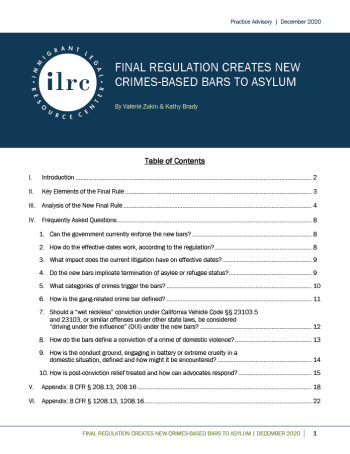
In October 2020, DHS and DOJ published a final regulation that sets out wide-ranging and draconian bars to applying for, and bases to terminate a grant of, asylum. For example, the bars include conviction of any felony, any controlled substance offense, a single DUI with injury, a DUI with a DUI prior (regardless of injury), and domestic violence bars based on the underlying conduct.
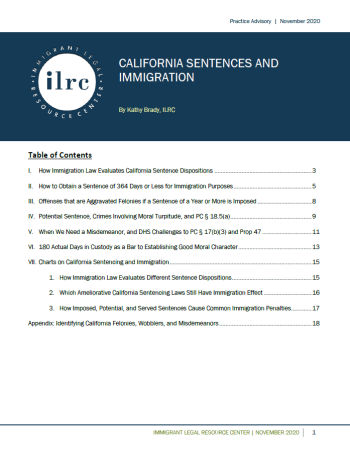
In some cases, the amount of an imposed, potential, or served criminal sentence can determine the outcome of the immigration case. The law governing how state sentencing dispositions affect immigration penalties is fast-changing. The good news is that an informed defender often can structure a sentence that gives the prosecution what they require, while avoiding immigration penalties. An informed immigration advocate wants to be able to explain this to an immigration judge or adjudicator to win the case.
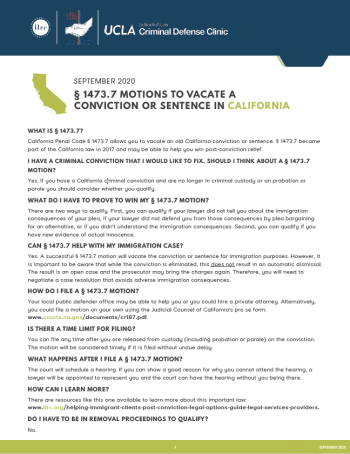
This one-pager, a partnership between the UCLA Criminal Defense Clinic, Al Otro Lado, and the ILRC, describes the how and why of CA Penal Code s. 1473.7.

In January 2020, the Committee for Review of the Penal Code began convening with the intent of putting forward wide ranging recommendations for reforms to the California criminal legal code. Understanding the significant impact of the process for California’s immigrant population, the ILRC has formally submitted recommendations, advice, and expert testimony as the committee engages in its deliberations. We will continue to update this site with our recommendations to the committee.